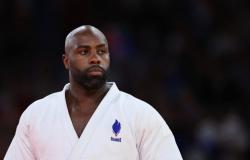Ludovic and Zoran Boukherma deliver a film of great beauty with Their children after theminspired by the novel by Nicolas Mathieu, Goncourt Prize in 2018 and published by Acte Sud. The directors of Teddy and of The Year of the Shark confirm their talent for diving into the heart of the French province. This story of a trio of young people – played by the brilliant Paul Kircher, awarded in Venice, Angelina Woreth and Sayyid El Alami – brings eastern France to life in 1992.
This brilliant chronicle divided into four parts spanning six years follows the evolution of adolescents and some of their parents, notably played by Ludivine Sagnier and Gilles Lellouche. Impossible not to think of Love phew in front of a surge of passions. The director duo does not dismiss this reference with a wave of the hand and agreed to talk about it with 20 Minutes. It was with the same voice that the twin accomplices responded to us.
How did your collaboration with Gilles Lellouche begin?
He’s the one who came to get us! Originally, we had to adapt the novel together to make a series and then Gilles had a lot of work with Love phew and we realized that we had been captivated by the book. It was obvious to us. So we continued to work on it.
Why did this story touch you?
We also come from a working-class and rural background. We understand the concerns of the main characters Anthony, Hacine and Steph. We found ourselves in all three at once. We grew up in a modest social environment which was practically the same as Anthony's. Our name is Boukherma: we also identified with Hacine because when we were young, we were always a little ashamed of our last name. We were also close to Steph. Like her, we left our original environment to go to Paris to try to make cinema.
Why did you choose Gilles Lellouche to play the hero's father?
When he called on us to write, he never told us about the fact that he wanted this role but we immediately had it in our heads when reading the book. He accepted immediately when it was offered to him. As he came out of the filming of Love phew that he achieved, he was very kind to us. He is a charismatic actor and we found it interesting to have him play a character who gradually fades away, a violent man who expresses a certain conception of virility before sinking.
Is he easily led?
With Gilles, everything is a question of trust. As soon as he grants it to you, it goes by itself: he lets it happen. We feel that he thinks a lot, that he is constantly questioning but it is never to the detriment of the film. His experience as a director did not make him authoritarian in the filming of others. And he understood so well this character of a man who loves badly those he loves deeply and pays the price dearly.
Are you afraid that the success of “L’Amour ouf” will torpedo the release of your film?
It's certain that the films are similar and that we have the same producers. Both are large family frescoes adapted from novels. We hope that the success of Gilles' film will carry over to ours. The audience of Love phew might also like Their children after them. It would be wonderful if our film could take over after the entries for Gilles's have run out of steam.
Don't you regret today not having stuck with the format of a series?
The idea of the feature film took hold. We thought for a while about distributing it on a platform but we very quickly had the idea of bringing the project to the big screen because it's a film which talks about people, which talks about France. We thought it was great to show this in cinemas so that spectators could discover it together. It was a way of paying homage to the France of our family and to our family itself. Our goal was to make a popular film, a word that has nothing pejorative about it.
Who do you think this story is for?
It can affect people of all ages. Nicolas Mathieu located the action between 1992 and 1998 because this allowed him to show a France in which there are the beginnings of the one we know today. It can speak to everyone to revisit this era when we still believed in a certain form of fraternity, in the “black-white-beur” of the Football World Cup with a possible reconciliation of the working classes. Four years later, Le Pen was in the second round of the presidential election. This is food for thought.






